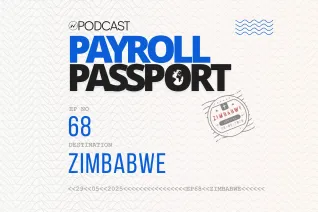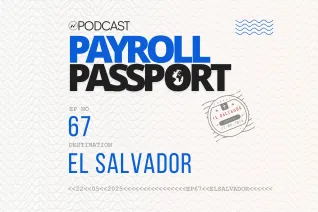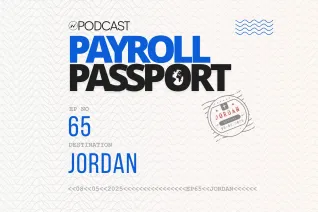Country Spotlight: Employer of Record in Nigeria

Known as the "Giant of Africa", Nigeria is not just a cultural and economic powerhouse but also a strategic gateway to business opportunities across the continent. With a growing population of over 200 million and a rapidly digitizing economy, Nigeria offers a strong case for global companies seeking expansion. However, compliance with the country’s detailed regulatory and labor requirements is critical, and a trusted Employer of Record (EOR) partner proves invaluable.
Essential Considerations for Hiring Employees in Nigeria
Hiring in Nigeria requires a deep understanding of local labor laws, statutory obligations, and cultural practices. Employers must comply with various national schemes and ensure timely filings and contributions. Below are the key considerations:
1. Employment Contracts and Legal Obligations
- Employers are required to issue written employment contracts within three months of hiring, detailing job responsibilities, remuneration, working hours, leave entitlements, and termination clauses.
- Employment relationships are governed by the Labour Act of 2004, which outlines minimum wage requirements, sick leave, maternity leave, and holiday benefits.
- Salaries must be paid monthly or more frequently and in legal tender (via cash, cheque, or electronic transfer).
2. Personal Income Tax (PIT) and PAYE
- PIT is governed by the Personal Income Tax Act (PITA) and is collected by the State Internal Revenue Services (SIRS) based on employees’ residency.
- PAYE tax rates range from 7% to 24%, with employers responsible for monthly remittances and annual tax return filings.
- Tax Clearance Certificates (TCC) may be required for public tenders, licenses, and official transactions.
ALSO READ | Nigeria: A Guideline to Payroll and Employer of Record

3. Statutory Contributions and Compliance
A. Pension Scheme (CPS)
- Employers with three or more employees must register under the Contributory Pension Scheme, with contributions of 10% by the employer and 8% by the employee.
- Managed by PENCOM, contributions must be remitted within seven working days from the date of salary payment.
B. National Housing Fund (NHF)
- Although voluntary for private sector employees as of February 2023, contributors pay 2.5% of their basic salary, with remittances due within one month.
C. Employees’ Compensation Fund (ECF)
- Employers must contribute 1% of monthly payroll to the NSITF. Filings of actual and projected earnings are due by February 28 annually.
D. Industrial Training Fund (ITF)
- Mandatory for employers with 25 or more employees, requiring 1% of annual payroll to be paid by April 1 each year.
- Up to 50% reimbursement is possible if approved training standards are met.
E. National Health Insurance Authority (NHIA)
- Employers with five or more staff must enroll in the state health insurance schemes.
- Contributions are jointly made by employers and employees at rates determined by the relevant state councils.
4. Working Hours and Leave Entitlements
- Standard working hours are 8 hours a day, 40 hours a week, Monday to Friday.
- Employees are entitled to:
- 6 days of paid annual leave
- 12 days of sick leave (with medical proof)
- 12 weeks of maternity leave (with 50% pay minimum)
- Paternity leave (provided in some states)
5. Payroll and Banking Requirements
- All salary recipients are required to have a Bank Verification Number (BVN).
- Payments must comply with foreign exchange control regulations, particularly under the Central Bank of Nigeria’s FX floating regime.
TUNE IN NOW | Payroll Passport Ep 28. Nigeria

Hiring Expats in Nigeria
Hiring expatriates in Nigeria requires employers to secure a Temporary Work Permit for short-term roles or an Expatriate Quota and a Certificate of Registration for Permanent Residency (CERPAC) for long-term positions. Expatriates are subject to personal income tax, and employers must remit PAYE monthly, provide mandatory health insurance (for firms with five or more staff), and contribute to the Employees’ Compensation Fund and, if applicable, the Industrial Training Fund. Compliance with these rules and proper documentation is crucial to avoid penalties or visa issues.
When hiring expatriates in Nigeria, employers must also comply with data protection laws, such as the Nigerian Data Protection Act, which requires the secure handling of personal data. This involves implementing strong privacy policies, appointing a Data Protection Officer, and ensuring employee information is protected against unauthorized access or breaches. Non-compliance can result in significant penalties, making robust data security essential for all organizations that manage expatriate data.
Why choose Neeyamo for your EOR needs?
Unlock the power of seamless international expansion with Neeyamo's Global Work solution. Neeyamo helps you hire employees in 150+ countries, allowing you to set no boundaries when hiring talent across the globe. Not convinced yet? Here's why we're your ideal partner:
Clueless with Compliance? Navigate complex international laws confidently.
Cost Concerns? Eliminate local entity setup and optimize payroll.
Riddled with Risks? Minimize legal and financial risks globally.
Hefty HR operations? From onboarding to offboarding, we take care of your employee life cycle.
Shoulder to Support? 24/7 expert assistance in 50+ languages.
Neeyamo? Your key to effortless global expansion!
Latest Resources
Stay informed with latest updates
If you're curious and have a thirst for knowledge pertaining to the HR, payroll, and EOR universe, don't miss out on subscribing to our resources.















